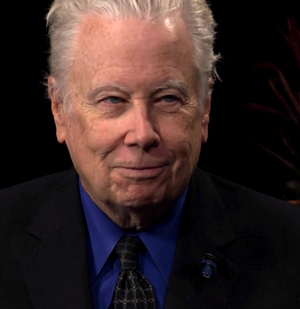

 Bio: Dr. John Alexander entered the U.S. Army as a private in 1956 and was a colonel when he retired. His second career was at Los Alamos National Laboratory where he created the military effort in development of non-lethal weapons and which involved him with the National Research Council, NATO, and the Army Science Board. His graduate studies include an MA, Pepperdine University, Ph.D. Walden University, and programs at The Kennedy School of Government, Harvard, Sloan School, MIT, and Anderson School, UCLA. An Aviation Week Aerospace Laureate, and listed in American Men and Women of Science, he is a past president of the International Assn. for Near-Death Studied, three-term councilor, Society for Scientific Exploration, and founding board member of the International Remote Viewer’s Assn. He is the author of many articles, monographs and books including UFOS: Myths, Conspiracies, and Realities with forewords by Jacques Vallee, Tom Clancy, and Burt Rutan.
Bio: Dr. John Alexander entered the U.S. Army as a private in 1956 and was a colonel when he retired. His second career was at Los Alamos National Laboratory where he created the military effort in development of non-lethal weapons and which involved him with the National Research Council, NATO, and the Army Science Board. His graduate studies include an MA, Pepperdine University, Ph.D. Walden University, and programs at The Kennedy School of Government, Harvard, Sloan School, MIT, and Anderson School, UCLA. An Aviation Week Aerospace Laureate, and listed in American Men and Women of Science, he is a past president of the International Assn. for Near-Death Studied, three-term councilor, Society for Scientific Exploration, and founding board member of the International Remote Viewer’s Assn. He is the author of many articles, monographs and books including UFOS: Myths, Conspiracies, and Realities with forewords by Jacques Vallee, Tom Clancy, and Burt Rutan.
Website: JohnBAlexander.com
Lecture: UFO Encounters: More Complex than We Imagine
Complexity is associated with many UFO encounters. This presentation includes my recent firsthand experience with a case so convoluted it defies both explanation and common sense. Nonetheless it is real and includes not only my observation of a UFO, but spontaneous healing, plus sightings/recordings of orbs, possible spiritual beings, and other phenomena. This will include photos that I took that are not easily explainable. In addition I will address an encounter that is compelling because of the status of the people involved. This case is bazaar (by rational standards) yet it is supported by physical evidence pointing to the reality of the encounter.
Many of these UFO-phenomena related events often are not isolated, one-time encounters, but result in multiple incidents that can occur over extended periods of time (days to years). There is a correlation between various phenomena such as UFOs, near-death experiences, psychokinesis, cryptozoology, and others. These phenomena are at least and complex as cancer, have the potential to impact most of the human population, yet receive minimal scientific attention.